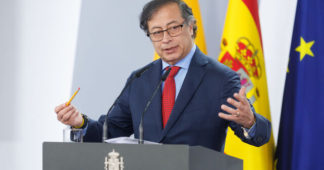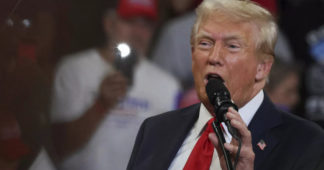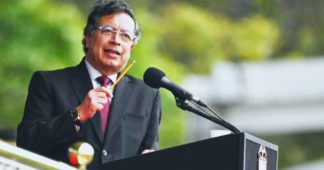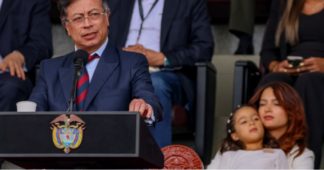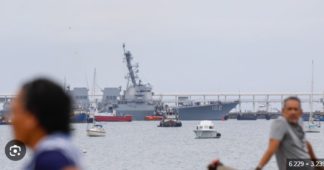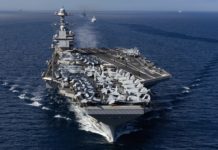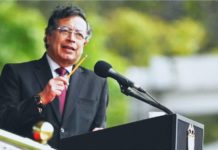As US warships inch towards Colombia and Venezuela, Petro denounces Trump’s airstrikes in the Caribbean as “extrajudicial executions”
by Devin B. Martinez
Oct 24, 2025
AsThe US continues to escalate threats and military pressure against Venezuela and now Colombia as well. On Friday, October 24, “Secretary of War” Pete Hegseth announced the deployment of aircraft carrier USS Gerald R. Ford (CVN-78), to the Caribbean. The most capable and lethal strike platform in the world adds to the already massive military buildup in the Caribbean of 10,000 US troops, at least eight war ships, P-8 surveillance planes, and F-35 jets deployed amid the Trump administration’s alleged counter-narcotics operations. US troops are also reportedly deploying to Trinidad and Tobago, mere miles from Venezuela, for five days of coordinated “military exercises”.
“It’s past time for Maduro to go. Keep it up, President Trump,” said Senator Lindsay Graham in an X post on Friday, October 24.
Venezuela is “a candidate for decisive military action on land, sea, or air” because it has for years been “a safe haven for drug cartels poisoning America,” Graham added.
During a White House address on October 23, US President Donald Trump said, “Now they’re coming in by land … I told them the land is gonna be next.”
“It’s very hard to find any floating vessel right now. In the Pacific or in the gulf,” Trump added.
Acknowledging the escalation that a land invasion would represent, Trump said, “We may go to the Congress and tell them about it but I can’t imagine they’ll have any problem with it.
On October 21 and 22, the US military also expanded their maritime operations to Colombia’s Pacific Coast, striking two boats near the South American country. The attacks marked the eighth and ninth such vessels blown up by the US, allegedly targeting drugs, but the first beyond the Caribbean Sea. Colombian President Gustavo Petro has called these attacks “murders” and violations of the country’s sovereignty.
At least 43 people have been extrajudicially executed in a total of ten boat bombings since September.
Petro defies Trump
Colombian President Gustavo Petro has been one of the most outspoken defenders of Venezuela amid the latest bout of US aggression, condemning the US military attacks in the region. At the UN General Assembly in September, Petro said the passengers on the boats were not narco traffickers but rather “poor young people from Latin America”. He went as far as to call for legal investigations into the US President for the extrajudicial killings:
“Criminal proceedings must be opened against those officials, who are from the US, even if it includes the highest-ranking official who gave the order: President Trump.”
Friction was already present then, especially after the US revoked the Colombian president’s visa over his remarks at the UNGA. Yet the tension sharply escalated this week. In a press conference last weekend, Petro declared, “Oil greed is behind the strategy that is firing missiles at fishermen.”
The Colombian head of state asserted that the US military aggression in the Caribbean and against Venezuela has nothing to do with fentanyl or drugs.
“What they want is Venezuela’s oil.”
To that end, the leftist president accused, the US is conducting “extrajudicial executions” in the Caribbean, in violation of international law. He also made a post on X, directly implicating the White House in the killing of a Colombian fisherman, in one of its missile strikes on a Caribbean vessel in mid-September.
“US government officials have committed a murder and violated our sovereignty in territorial waters,” Petro wrote.
The Latin American leader said that fisherman Alejandro Carranza “had no ties to the drug trade”, and emphasized that the small Colombian vessel had experienced an engine failure and “had its distress signal up”, seeking help when it was targeted by the US.
Trump unleashes threats on Colombia, and bombs off its coast
Petro’s comments aggravated US President Trump, who took to his Truth Social platform to call the Colombian president an “illegal drug leader” on Sunday.
In an apparent threat of direct military confrontation, Trump said Petro “better close up these killing fields immediately, or the United States will close them up for him, and it won’t be done nicely.”
In response to Trump’s threats, Colombia recalled its ambassador to the US and asserted that Colombian troops would not support a potential military intervention in Venezuela.
“What Colombian would help invade where their own family lives, only to see them killed like in Gaza?” Petro said.
The diplomatic row continued through the week, with Trump announcing on Wednesday that all funds to Colombia had been cut and threatening higher tariffs.
“What happens if they take away aid? In my opinion, nothing,” Petro said in a news conference on Thursday. Confident in his country’s ability to mitigate the effects of tariffs, he claimed that Trump is unlikely to raise tariffs on oil and coal because of the potential consequences. Since these industries represent 60% of Colombia’s exports to the US, the majority of their trade is relatively safe, while alternative markets exist for other industries that may be more vulnerable.
Trump also doubled-down on his characterization of the Colombian president as a drug leader this week, as well as his threats of military confrontation.
“They’re doing very poorly, Colombia. They make cocaine. They have cocaine factories … he better watch it or we’ll take serious action against him and his country,” Trump said.
On October 24, US Treasury Secretary Scott Bessent announced that he was levying sanctions against Petro and members of his family, alleging “cocaine production in Colombia has exploded to the highest rate in decades, flooding the United States and poisoning Americans.” Bessent insisted that “President Petro has allowed drug cartels to flourish and refused to stop this activity.”
In response, Petro declared that he would take legal action in the US justice system against Trump’s accusations.
“I will defend myself judicially with American lawyers in the American justice system” from the ‘slanders’ by high-ranking officials, said the leftist leader.
Although Washington decertified Colombia’s efforts to combat drug trafficking in September, claiming that the country is not doing enough in counter-narcotics, Petro says 17,000 cocaine factories have been destroyed under his government.
He has also pointed out that drug trafficking is concentrated in Ecuador. “It already seems that most of the export of cocaine through the Pacific is being made from the ports of Ecuador” turning it into the “largest cocaine export platform in the region.”
Amid the threats and accusations from the White House against Petro and his country, the US military targeted two small boats off the coast of Colombia this week, expanding its war at sea from the Caribbean into the Pacific.
Attempts to bolster the Colombian far-right ahead of elections
Another significant accusation that President Gustavo Petro has levied against the US, is that Trump’s military and diplomatic pressure against Colombia aims to boost far-right forces in the country ahead of elections.
Colombia’s presidential election is scheduled for May 31, 2026, and legislative elections will be held in March.
Petro, Colombia’s first leftist president, was elected in 2022. Since Colombia’s constitution doesn’t allow consecutive re-election, Petro will be leaving office next year. While his administration pursued major reforms in labor, social welfare, and foreign policy, many of those reforms have struggled in a divided Congress and a deeply polarized country.
In this context, the nation’s next president could have a major impact on whether Petro’s agenda and direction for the country continues, is slowed, or totally reversed.
Leading up to the elections, voters are undoubtedly paying close attention to how well this administration manages diplomatic crises, economic policy, and security. At such a critical time, threats, condemnations, and mischaracterizations from the US could feed opposition narratives about a leftist government being incompetent, “soft” on security, or uncooperative with counter-narcotics and the US military. Cuts in aid also represent a form of pressure, reducing the state’s capacity and even security in some cases, opening opportunities for the far right.
On the other hand, Washington’s aggression also risks provoking deeper unity in the country behind the leftist, sovereigntist direction. As Petro frames the US missile strikes as “violations of sovereignty” while the US continues to threaten confrontation or invasion, an anti-imperialist sentiment could quickly grow among his base.
At a critical moment for Colombia, Petro has argued that the purported “drug-trafficking operations” are instead a political tactic that aims to tip the scales internally in favor of US interests.
Regional solidarity with Colombia and Venezuela
The solidarity between Colombia and Venezuela has taken center stage this week as both countries find themselves under increasing pressure from the US. But there is a wave of solidarity growing across Latin America and the Caribbean and the rest of the world amidst the escalating aggression.
“The U.S. president has unleashed a series of lies and falsehoods aimed at linking President Petro and his government to illicit drug production,” denounced the Bolivarian Alliance for the Peoples of Our America (ALBA-TCP) in a statement released October 21.
The US is launching “threats of military action and unilateral coercive measures that constitute a flagrant violation of Colombia’s national sovereignty,” the regional forum declared.
On October 22, Venezuela’s Minister of Defense Vladimir Padrino Lopez announced that Colombia has the full support of the Bolivarian National Armed Forces.
“Anyone who refuses to kneel before US imperialism risks being called a narcotrafficker,” he said. The insult “offends not only [Petro] but also the Colombian people.”
In a televised address, Nicólas Maduro said, “Colombia knows that we are one … If they touch Venezuela they touch Colombia, we are one homeland of the heart.”
Διαβάστε επίσης:
Amid tension between Venezuela and the US, Lula criticizes “foreign interventions in Latin America”
Brazil’s MST will organize internationalist brigades to support Venezuela in the case of a US invasion
We remind our readers that publication of articles on our site does not mean that we agree with what is written. Our policy is to publish anything which we consider of interest, so as to assist our readers in forming their opinions. Sometimes we even publish articles with which we totally disagree, since we believe it is important for our readers to be informed on as wide a spectrum of views as possible.
